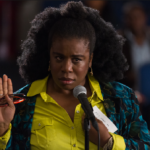A conversation about the impact of the film Miss Virginia
By Virginia Walden Ford
When I was approached more than a decade ago about the potential for a feature film to be made about my life, I was more than skeptical.
Why me? There were so many other people in the world with stories that were world-changing, so many people who had struggled in worse ways than me, so many people whose success was truly something to admire.
Sure, I had accomplished some difficult tasks. But I had done so with a lot of help from other like-minded parents, concerned lawmakers, and even the President of the United States. In my opinion, my work to provide greater educational opportunities for the children of Washington, DC—and beyond—had met a providential fate that connected me with the right people at the right time, giving me the courage to persevere when the going got tough.
That wasn’t movie worthy. It was pretty average.
What I’ve come to realize, though, in the years since that initial conversation about the feature film that eventually became Miss Virginia, is there is power in the everyday. When people see someone else overcome a struggle, they are often moved to action themselves.
The creative and passionate team at the Moving Picture Institute saw the potential in my story to inspire others. They knew what I would come to know during the process of making this film: true stories are a catalyst for change.
Under the direction of the brilliant R.J. Daniel Hanna, Miss Virginia was created—piece by piece. Celebrities I only knew from films and TV shows read the script, believed in its message, and signed on to star in it. I began to see the vast potential of this film and what it could mean for other “average” people, like myself, who had an important story to tell.
Since its world debut in the fall of 2019, Miss Virginia has been viewed by people either at theaters, through at-home streaming, through a cable-TV provider such as BET, or through planned viewing events. The film is available on thousands of streaming platforms and reaches hundreds of millions of people. It has been featured on many lists of important films about women, mothers, and African American people. Every day I receive messages from people all over the US and the world telling me how much the movie inspired them and moved them to their own courses of action.
Some people have a direct relationship with the subject matter of the film and are inspired to seek more choices in education in their own communities. Others are parents or grandparents who want to share their own “aha” moments when it comes to advocating for their children or their communities or themselves. Sometimes I hear from someone who has a fear of public speaking and is inspired by the scene in the movie where Uzo Aduba so beautifully portrays the moment I overcame my fear of my voice being heard.
Whatever their need or message, these people were all inspired by the story of the film—by my story. Whether it is regarding a minor detail like my frustration with my son’s principal or a major accomplishment like passing the DC Opportunity Scholarship alongside my rag-tag team of parents, the many messages I receive from viewers remind me that it is the relatable details of our stories that move people.
In addition to the anecdotal components of the film, I sat down recently and wrote down some of the tangible ways this film has truly made a difference for families all over this country and beyond. I want to share those with all of you:
Policy
The COVID-19 pandemic that started in the spring of 2020 forced the education system in the US to ask itself: Are we truly meeting the needs of our students? As issues of technology disparities, hunger, and other inequalities came under the spotlight, people across the nation were forced to face a discouraging truth: not all schools nor all methods of delivery of education are truly equal in this country.
While the loss associated with the pandemic is insurmountable, it was a needed wake-up call when it comes to education in our country. I feel humbled and grateful that as people stayed home and had the chance to curl up on their couches and watch TV, they were able to view Miss Virginia on Netflix and other streaming platforms. During that time, some important decision makers saw the film.
Case in point:
In May of 2021, I was the guest of the nonprofit Empower Illinois, a group that supports needs-based scholarship programs so the children of their state can attend the best schools for their individual needs regardless of where their home is located. I met with wonderful leaders in the group, visited St. Patrick Catholic School in Springfield, and then had the opportunity to meet with Speaker of the Illinois House of Representatives Emanuel “Chris” Welch.
Once a critic of school choice programs, Speaker Welch told me that seeing the film Miss Virginia helped turn the tide of his opinion on this issue. He was able to see what choice in education could mean for a single child and a single mother—and extrapolate that to his own constituents.

Illinois Speaker Emanuel “Chris” Welch and in May, 2021
He is now a vocal proponent of expanding educational opportunities in his state—and was a leader in extending, and expanding, the state’s current tax credit scholarship program. The film could not change education policy on its own—that required the hard work of the Empower Illinois group and their colleagues—but I am grateful that it was able to be the vehicle that changed one very influential mind.
Parent Groups
For decades, parents in educational opportunity groups across the country have advocated for more choices for their children and their neighbors’ children. My parent-led group, DC Parents for School Choice, is just one of hundreds. These groups knock on doors, hold meetings, create informative literature and websites, call and email legislators, speak to policymakers, and organize to maximize the reach of their voices. Due to the hard work of groups like these, school choice continues to expand in our country through a variety of delivery methods that include tax credit scholarships, education savings accounts, and more.
Since beginning this film journey, I have had the privilege to meet with parent-helmed groups all over the country—from Rhode Island to Indianapolis to Phoenix and beyond. I have seen the hard work these groups consistently do to improve educational outcomes for their children. Their accomplishments have a ripple effect, inspiring those in other communities to act similarly.
I have been humbled to see how effectively Miss Virginia illustrates the importance of fighting for school choice. Parents see themselves in the characters on screen—and the film provides a jumping off point as it helps people find their own courage to speak up.
In February of 2021, I was asked to be on a virtual panel of wonderful parents who shared ideas with each other, and with those listening in, on how to advocate for better educational opportunities for our children. Most of the parents on the panel have children who are school age, and they are actively fighting for more educational options for them. I was thrilled to serve in the role of mentor, sharing what worked in my own fight and listening to what is currently working for them.
Between informational, forum-style sections of the virtual event, clips from Miss Virginia were shown to introduce and reinforce the concepts being discussed. The film provided an entry point for those who were looking for a way to start their own movements.
Seeing the film used as an educational tool for other parents brings me so much joy. It is exactly what I hoped would happen when I agreed to having it made.
Moms, Dads, Grandparents and More
Sometimes the changes inspired by the film are not sweeping legislation or newsworthy on their own but, collectively, they matter.
Here is a sampling of messages I’ve received from individual viewers of the film:
“I just recently watched the film Miss Virginia, and it has inspired me to begin to advocate for an area of education equality that I personally am passionate about—homeless and transient students.” –Danielle
“I definitely believe in your fight. We as adults need to be more involved, because at the end of the day the children that we raised will shape the world that we will live in. And I believe that what you fight for plays an extremely important part of the vision that needs to be achieved.” –Richard
“I love the movie Miss Virginia. It is an inspiring story and one that got me through some hard times. Thank you for not giving up on your son.” –Jillian
“Me and my 24-year-old daughter recently watched your movie. She is going to law school. I work in the education system. How can I make a difference like you? I am so inspired and in tears with the change you’ve implemented.” –Tiffany
“After watching Miss Virginia a few months ago, you inspired me to continue seeking the best education for my children. The challenges of being low income are now forcing me to choose between homeschooling or public education. As a mother of 3 beautiful children, I’m sure you can imagine the difficulties I’m encountering as a working woman.” –Charnel
“I just finished watching the movie Miss Virginia and I am beyond inspired! A former administrator worked in DC Public Schools and confessed that school choice really caused the public school system to step up. That inspired me and I would love to know how we can do the same here in my state.” –Jeanisha
Remember that your stories matter and that you have a responsibility to tell them. There is power in what you have been through and in what you continue to accomplish. Allow the world access to that power, your power, by telling your own stories to those in your sphere of influence. You never know what difference one voice can make!
Have something to share? Contact Virginia Walden Ford at vwf@virginiawaldenford.com.
Click here to book Virginia Walden Ford for a virtual or in-person appearance.



